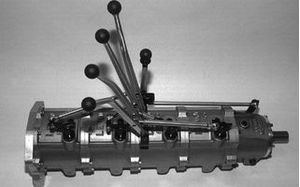
Professional race car owners understand the critical role that automatic transmissions play in achieving optimal performance on the track. Upgrading your automatic transmission can significantly enhance your racing car's capabilities and improve overall performance. In this article, we will delve into the world of automatic transmission upgrades specifically tailored for racing and performance cars. From gear ratios to torque capacity and cooling systems, we will explore the precise and specific upgrades that can give you the competitive edge you need.
In the realm of racing, automatic transmissions are responsible for transferring power from the engine to the wheels efficiently. Every aspect of transmission performance, from gear ratios to shift speeds, plays a crucial role in achieving optimal acceleration, cornering, and overall track performance. Understanding how these factors influence transmission performance is vital for selecting the right upgrades.
Benefits of Upgrading Automatic Transmissions for Racing Cars
- Improved Gear Ratios and Shift Speeds: Upgrading your transmission allows you to customize gear ratios to suit specific track conditions. Additionally, faster and more precise shifting capabilities enhance acceleration and maintain momentum through gear changes.
- Enhanced Torque Capacity: High-performance clutch packs and bands can handle the increased torque demands of racing engines. Upgrades in this area improve power transfer efficiency and reduce slip, ensuring maximum power reaches the wheels.
- Cooling and Heat Dissipation: Intense racing conditions can lead to transmission overheating. Upgrading to high-performance transmission coolers with increased cooling capacity ensures efficient heat dissipation and prevents transmission damage.
- Launch Control and Traction Management: Advanced features such as launch control and traction management optimize acceleration off the line, minimizing wheel spin and maximizing power delivery. These upgrades help you achieve faster and more consistent launches.
Automatic Transmission Upgrades for Racing Cars
- Performance Torque Converters: Installing high-stall torque converters allows for improved launches and increased torque multiplication. Customized stall speeds based on engine power and racing application ensure optimal performance.
- Valve Body Modifications: Upgrading the valve body with a shift kit enables quicker and firmer shifts, reducing shift lag. Manual valve body conversions provide complete control over gear selection, allowing precise gear changes based on racing requirements.
- Transmission Cooler Upgrades: High-capacity transmission coolers with increased surface area and auxiliary cooling systems ensure efficient heat dissipation. These upgrades prevent transmission overheating, maintaining optimal performance during intense racing conditions.
- Electronic Transmission Control Units (TCUs): Standalone TCUs offer precise control and tuning of transmission parameters. With programmable shift points and torque management, TCUs allow for fine-tuning to optimize performance and achieve consistent shifts.
Rules and Regulations for Automatic Transmission in Racing Vehicles
When it comes to rules and regulations in car racing regarding the automatic transmission, specific requirements can vary depending on the racing series and class. Here are a few examples of rules and regulations that may pertain to the installation and use of automatic transmissions in races:
Transmission Type Restrictions:
- Certain racing classes may mandate the use of a specific type of transmission, such as sequential or dual-clutch transmissions, while prohibiting others.
- Some series may require the use of stock or OEM-based transmissions, limiting modifications and aftermarket upgrades.
Gear Ratio Limitations:
- Racing regulations may impose restrictions on gear ratios, either by specifying a fixed set of gear ratios or limiting the allowable range of gear ratio modifications.
- This ensures a level playing field and prevents teams from gaining an unfair advantage through extreme gear ratio modifications.
Torque Converter Regulations:
- In some racing classes, rules may govern the use of torque converters, such as specifying a maximum allowable stall speed or prohibiting certain types of torque converters altogether.
- These regulations aim to control power delivery and ensure fair competition among participants.
Weight Penalties or Adjustments:
- To balance performance between different cars or classes, racing series may impose weight penalties or adjustments based on the type of transmission used.
- Automatic transmissions, especially those with advanced features, may incur additional weight penalties to maintain parity with manual or other transmission types.
Electronic Control Unit (ECU) Limitations:
- Some racing classes may restrict the use of aftermarket or standalone ECUs for transmission control, mandating the use of factory or spec ECUs.
- This regulation ensures standardized control and prevents teams from gaining an unfair advantage through advanced transmission tuning capabilities.
Transmission Cooling Requirements:
- Racing regulations may specify minimum cooling requirements for transmissions to prevent overheating during races.
- These requirements may include the installation of dedicated transmission coolers or restrict the use of certain cooling methods.
It's important to note that these examples are general in nature, and specific rules and regulations can vary significantly among different racing organizations, series, and classes. Therefore, it's crucial to consult the rulebook and regulations of the specific racing series you participate in to ensure compliance with the transmission-related guidelines. Adhering to these regulations ensures fair competition and a level playing field for all participants.
Selecting the Right Upgrades for Your Racing Car
Consulting with professional transmission builders is crucial when selecting upgrades tailored to your racing goals. Their expertise will help identify the optimal upgrades based on your specific requirements and ensure compliance with racing class restrictions and regulations. When it comes to finding reputable transmission builders, rebuilders, and transmission shops that specialize in transmission tuning, a valuable resource is the online directory at www.go4trans.com.
www.go4trans.com is a comprehensive online directory that connects transmission rebuilders with a network of trusted professionals in the transmission industry. Whether you're looking for expert advice, custom transmission builds, or performance upgrades, this directory provides a curated list of transmission specialists who have extensive experience working with racing and performance cars.
When selecting a transmission builder or shop from www.go4trans.com, take the time to read customer reviews and testimonials to gauge their reputation and the experiences of previous clients. This information can help you make an informed decision and choose a transmission specialist who aligns with your expectations and racing goals.
Installation and Tuning
Professional installation and calibration of the upgraded components are essential for their proper functioning. Skilled transmission specialists will handle the installation process and ensure precise tuning and calibration for optimal performance and reliability.
Maintenance and Care
Regular inspections, fluid changes, and ongoing monitoring of critical parameters are essential for maintaining the upgraded transmission's performance. Regular upkeep and adjustments will help fine-tune the transmission to maintain optimal performance on the track.








